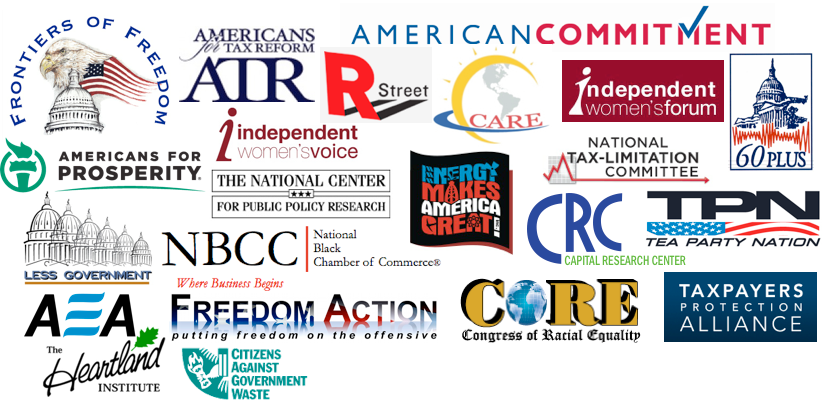Re: Renewable Fuel Standard “Reforms”
Dear Senator & Representative:
It has come to our attention that Congress is considering legislation this fall to reform the Renewable Fuel Standard (RFS). We, collectively and individually, believe the only reform to this failed government mandate should be to repeal the RFS. Repealing this mandate would bring certainty to the fuel markets and eliminate the harmful impacts this government program has had on businesses and consumers.
The RFS is a clumsy and misguided command and control mechanism that requires a certain level of ethanol to be blended into the nation’s transportation fuel supply. Gasoline has been required to contain 10% ethanol. The EPA plans to increase the amount of ethanol blended into gasoline by 50%. This is a horrifically bad idea. Congress has been working towards ending the counter-productive and costly RFS. Debt limit negotiations or other legislative vehicles moving through Congress at this time should not be used to expand regulatory burdens and impose additional costs on Americans.
The RFS have a number of unintended consequences that harms almost all sectors of the economy and saddles American taxpayers with higher fuel costs and higher food prices. Not only is corn – an important food staple – dramatically more expensive, but the price of milk, eggs, and meat and anything made with corn or its sweeteners will also increase as more and more corn is diverted away from food and animal feed and instead devoted to fuel.
The RFS will increase the cost of gasoline and diesel. A study by NERA Economic Consulting concluded that the new Renewable Fuel Standards will cause a 30% price increase to gasoline and a 300% price increase for diesel in 2015. Additionally, the RFS reduces fuel efficiency. Ethanol has a much lower energy density than gasoline. According to U.S. News, ethanol delivers 25% fewer miles per gallon than gasoline.
Numerous studies show that ethanol’s corrosive properties damage engines. Increasing the blend by 50% will damage newer automobiles and could prove dangerous in older vehicles. Numerous manufacturers have warned against the new ethanol blend and the AAA has issued a warning as well.
The new RFS will make it even more difficult for auto manufacturers to meet CAFE standards. While the CAFE standards have been dramatically increased, the new RFS would mandate the use of fuel that will provide substantially fewer miles per gallon. Consumers will be stuck with the associated costs and taxes.
The RFS is burdensome and unrealistic for most small business owners. Gas stations are almost entirely individually owned and operated (about 95%) and it will be very expensive to either: (i) add additional pumps to sell both ethanol blends, or (ii) install new pumps that can blend both types. Most gas stations make only a few pennies per gallon so their margins are quite thin. We cannot afford to send more small businesses into bankruptcy and to destroy more jobs.
The new RFS create more net harm to the environment than simply using fossil fuels. Ethanol requires fertilizer, pesticides, and large quantities of water. A great deal of energy is expended to create the corn, and then distill the ethanol for fuel purposes. Numerous independent studies have concluded that it is more harmful to use more land, fertilizers, pesticides, and water to grow more corn and more energy intensive to then turn that corn into ethanol that it would be to simply refine more petroleum. The Organization for Economic Cooperation and Development concluded that “The overall environmental impacts of ethanol and biodiesel can very easily exceed those of petrol and mineral diesel.”
With the recent scandals at EPA showing its lack of transparency and its willingness to break the law to further its agenda, expanding the RFS would only give the EPA another avenue to exercise power over the lives of Americans and further harm the economy. Extending the RFS benefits only EPA bureaucrats and rent-seekers. The RFS imposes higher costs on consumers and small businesses, kills jobs, and harms both the economy and the environment. We should repeal the RFS entirely. Let consumers and the marketplace determine how much ethanol should be blended with fuel.
Sincerely,
George Landrith, President
Frontiers of Freedom
Phil Kerpen, President
American Commitment
David A. Ridenour, President
National Center for Public Policy Research
Harry C. Alford, President & CEO
National Black Chamber of Commerce
Heather Higgins
Independent Women’s Voice
Seton Motley, President
Less Government
Andrew Moylan, Senior Fellow
R Street Institute
David Williams, President
Taxpayers Protection Alliance
Jim Martin, President
60 Plus
Marita Noon, Executive Director
Energy Makes America Great Inc.
Citizens’ Alliance for Responsible Energy
Grover Norquist, President
Americans for Tax Reform
James Valvo, Director of Policy
Americans for Prosperity
Judson Phillips, Founder
Tea Party Nation
Thomas J. Pyle, President
American Energy Alliance
Terry Scanlon, President
Capitol Research
Myron Ebell, Director
Freedom Action
Lew Uhler, President
National Tax Limitation Committee
Niger Innis, National Spokesman
Congress of Racial Equality
Sabrina Schaeffer
Independent Women’s Forum
Joseph Bast, President
Heartland Institute
Tom Schatz, President
Council for Citizens Against Government Waste
Affiliations are listed for identification purposes.
